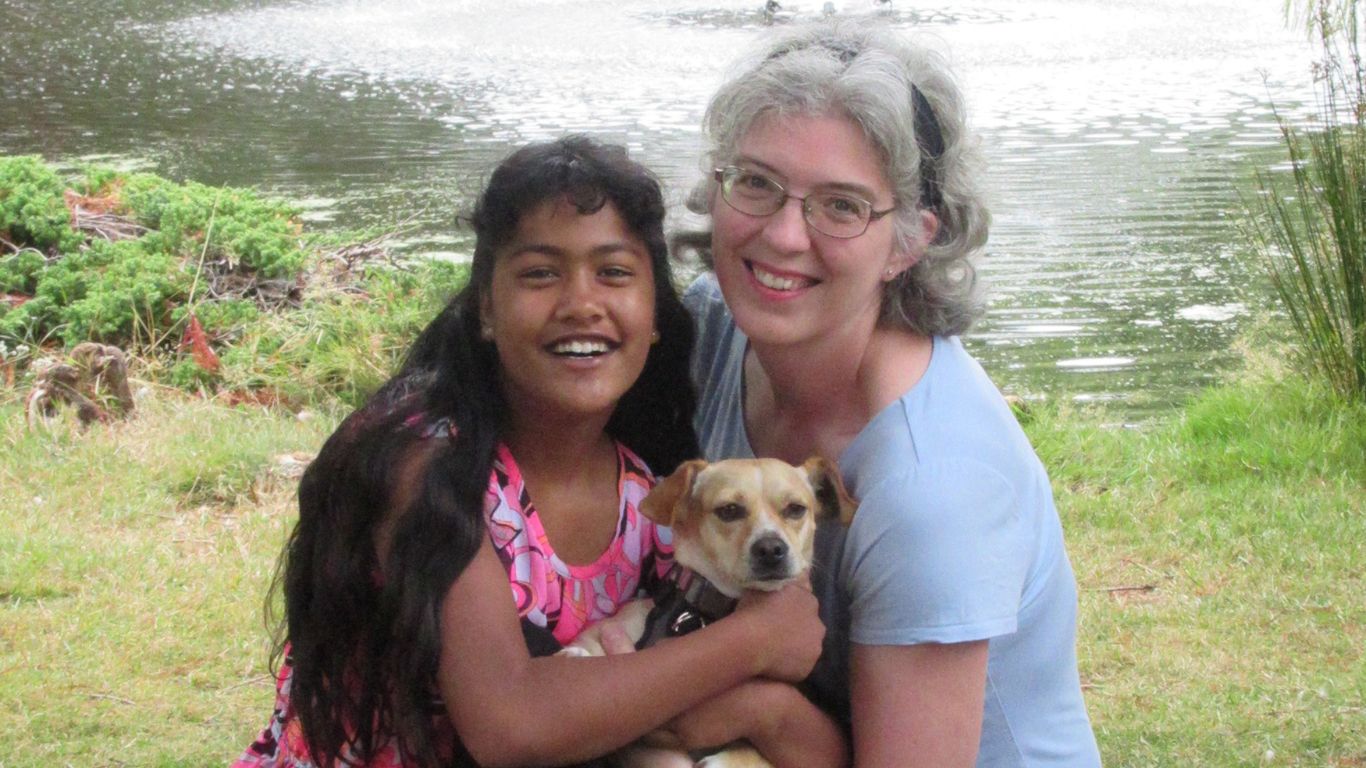Respite is a vital support for many adoptive, kinship, and other permanency families, but it can be a challenge to access funding and to find trustworthy and reliable caregivers. In this article, an adoptive mom of many explains how to make respite a basic part of your family lifestyle rather than a last resort.
“I can’t deal with this right now”
My beautiful daughter’s hair was plastered to her head, soaked in sweat. Her clothes were covered in dirt from her tantrum, which almost always has her kicking and screaming on the floor, or the ground, or wherever.
“You are SO STUPID!” she yelled as she picked up another handful of rocks.
My parents stood by watching, horrified, as this precious child pelted us and my husband Tyler’s work truck with rocks, some of which were big enough to do real damage.
“Just take her with you!” I whispered to Tyler.
“But we said no… we shouldn’t give in like this!” he said back.
“Just take her,” I replied, “I can’t deal with this right now.”
This will probably always stand out in my mind as one of the key moments when I realized we needed some help.
My husband Tyler and I have two biological children and three adopted children. We’ve also been foster parents since 2011. We live on a small farm in rural northeastern British Columbia, and we homeschool. One of our adopted children has six different diagnosed behaviour conditions, some of them quite serious. Another is on a feeding tube and is at risk for Fetal Alcohol Spectrum Disorder (FASD) and neurobehavioural issues.
The hardest lesson I’ve had to learn is to ask for help.
No one can do it alone
How do you know when you need respite? Extreme fatigue and caregiver anxiety are some of the first indicators. I think the most telling sign for me, though, is when my joy is gone. When that happens, something needs to change.
One of the biggest battles parents of children from hard places face is that we feel we have to act like we have it all together. Our culture is quite judgmental, and in many ways we’ve lost the feeling of being part of a community. We’re isolated and alone and have been conditioned to not ask for help.
There’s a lot of social pressure to have healthy, well-adjusted, well-behaved kids. For parents caring for support needs kids, that can result in a heavy dose of judgement, especially when those support needs are invisible, as they are in most kids with FASD. People are usually fairly tolerant of a 2-year-old having a huge meltdown but they’re much less tolerant when it’s a 6-year-old having one, especially when the 6-year-old doesn’t look like they have support needs.
Somewhere along our journey I got the message that we were supposed to do it all. As an active foster home we’re the respite providers, not the respite takers. How could I possibly ask for help? I’ve cared for 18 kids in addition to our own five, some with serious support needs or high-risk behaviours. If I have to ask for respite doesn’t it mean I’m failing?
No. It doesn’t. But it’s taken me a long time to realize that.
How to pay for respite
What about cost? Often respite funding is available, it just isn’t advertised. Don’t take no for an answer. Remember, you need this. If possible, put away a small amount of money off each pay cheque towards your respite fund, too.
If you’re an adoptive family, look into Post-Adoption Assistance (PAA), which is offered through the Ministry of Children and Family Development (MCFD). Many adoptive families are eligible for respite funding through PAA if they adopted through MCFD.
If you’re caring for a child or youth with support needs, you may also be eligible for family support services through the government, which can include respite funding.
You can also check with your local Community Living program, FASD Key Worker, and Child and Youth Mental Health office for additional supports. Ask your child’s pediatrician or psychiatric team if they know of any other available resources.
Ask friends and family to step in
Unfortunately, even with funds in place, finding appropriate respite can be just as draining as caring for a high-needs child. So where do you even start? When resources are scarce (and skilled workers and respite providers often are) think outside the box [but always do a vulnerable sector background check! –Ed.].
Are there any mature teens in your area that could do regular babysitting for you? Arrange to have them come weekly, bi-weekly, or as often as needed. If you have a medically fragile child, is there a retired nurse, medical student, or first aid instructor in your area that would be willing?
Don’t forget about extended family. Could you arrange for a schedule of different aunts and uncles or grandparents to provide some relief for you?
Reach out to experienced foster parents, retired school teachers, public school educational assistants, or student teachers who may want some additional work on the side or over the summer.
Arrange for your spouse or a friend who’s also a parent to stay home with the kids, and then return the favour.
Different children obviously have different levels of need. Children who are medically fragile or who engage in high-risk behaviors may need different care providers than babies or toddlers. View each suggestion through the lens of your child’s needs.
Try community programs
Look at community programs like swimming lessons, art classes, public library programs, summer sports camps, and even preschools for young children.
Whatever you do, arrange to have as many of your kids as possible attend at once. If it’s a lesson of some sort, advocate to have the lessons overlap or take place at the same time while you sit on the side lines with a book or head to a coffee shop.
That said, some children don’t do well in community programs or lessons due to extreme behaviours. Even if only some of the children in your care can participate, it might still be worth it. A partial break is a break!
Remember that anything can be respite. If it gives you a needed break, it’s working. If it creates too much hassle, try something else. Don’t stop searching until you get the break you need!
Be your own best advocate
As permanency families, we have to advocate for ourselves. If someone criticizes you for seeking respite care, act like a duck and let it roll like water off your back. You’ll be the best parent you can be when you’re well rested and full of joy. Let that drive you to keep searching.
Once you have a respite provider in place, you need to let go, and accept help. Our journey to find respite, accept that we need respite, and not live in fear of others’ judgements of our children or our need for help has been difficult. I struggled with guilt and shame initially.
Now we enjoy the benefits of receiving respite as well as the satisfaction of being a source of respite for other foster parents. We’d love to encourage you, if you are struggling in your journey. Email us at jaylercontracting@live.ca, or find us on Facebook (TylerandJamie Giesbrecht).
Jamie and Tyler Giesbrecht ride horses and chase their children around on a small farm in northern British Columbia. When they aren’t homeschooling, hatching ducks and chickens, hand-shearing sheep, or riding the horses to Petro-Canada for snacks, they like to fish and hunt, and explore the Northwest Territories and Yukon. They are an open foster home and are respite providers. They love to talk about adoption.





